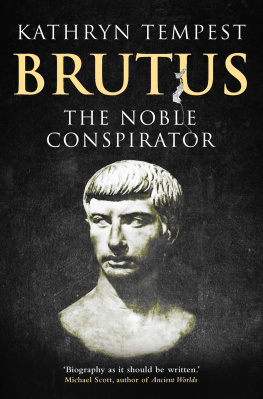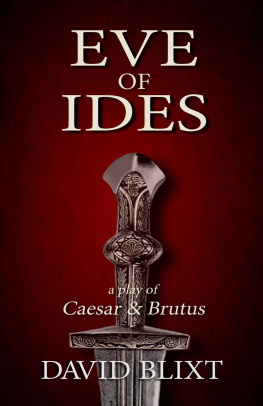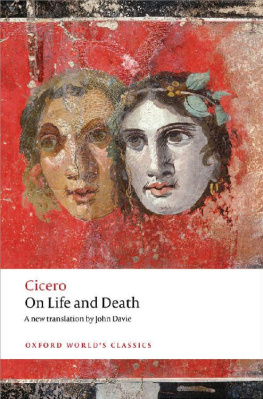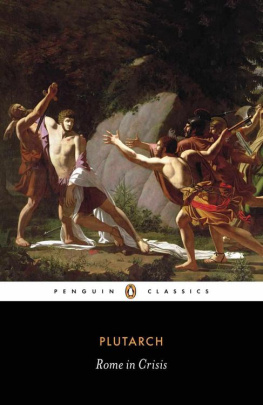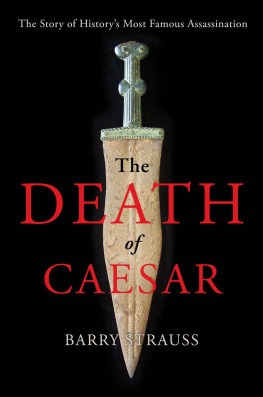BRUTUS

Copyright 2017 Kathryn Tempest
All rights reserved. This book may not be reproduced in whole or in part, in any form (beyond that copying permitted by Sections 107 and 108 of the U.S. Copyright Law and except by reviewers for the public press) without written permission from the publishers.
For information about this and other Yale University Press publications, please contact:
US Office:
Europe Office:
Set in Minion Pro by IDSUK (DataConnection) Ltd
Printed in Great Britain by TJ International Ltd, Padstow, Cornwall
Library of Congress Control Number: 2017948509
ISBN 9780300180091
A catalogue record for this book is available from the British Library.
10 9 8 7 6 5 4 3 2 1
CONTENTS
ILLUSTRATIONS AND MAPS
Illustrations
Maps
PREFACE
But on the day of Brutus judgment, Caesar came without scroll or senate to declare verdict.
You demean yourself, dear Brutus, he said almost gently, attempting suicide like this. But death for you, my friend, is not an option. You will live forever, eyes sad, in the shadow of my name.
And Brutus did live forever. He found himself not dead but filled with youth and eternity. Ashamed of his past, he travelled the worlds as Marcus, boundless centuries of world after world, from one galaxy to another, finding no peace.
A shadow ... If anyone spoke his name, it was in the same sentence as Caesar. Never just Brutus.
Eugene Bacon, 2015, Being Marcus, New Writing 12.3, 351
This extract from a short piece of fictional writing shows that the name of Marcus Brutus may suddenly pop up anywhere, even, as in this story, as a personal trainer at a fitness studio, somewhere on Earth in the twenty-first century. Condemned by Caesars ghost to a lifetime of immortality, he has seen his reputation wax and wane throughout history. He has witnessed his own reception: as Caesars assassin in Shakespeare and the eternal traitor chewed by Satan in Dantes Inferno, and he disdains it. History has forgotten the real Brutus, the reader is caused to reflect; the memory of his life has been eclipsed by that of Caesar. And here lies part of the problem in reconstructing a biography for Brutus; from the moment he stabbed Caesar, he has continued to capture the imagination of those who have studied him and his role in the assassination. Thus the judgments have all been pronounced with the clarity and bias that hindsight seemingly provides. Yet, despite his popularity in literature and history, biographical studies of Brutus have not been plentiful.
Already for Max Radin, writing Marcus Brutus back in 1939, the challenge was to present a living man and not a symbol. That man, in Radins conclusion, was a conflicted personality; his desire to follow where Cato led forced him to pursue a career that was essentially repugnant to him. We might disagree with the conclusion today, but still the approach was more imaginative than that of Grard Walters study (Brutus et la fin de la Rpublique), published in France the year before, which largely retold the story of Brutus from the ancient evidence, with little or no attempt to evaluate the material on which its conclusions were based. Since then, scholarship has moved on. Martin Clarkes The Noblest Roman, published in 1981, aimed to present an account of Brutus based on the ancient evidence, as well as to trace the course of his posthumous reputation. To this day, Clarkes work remains one of the best and most accessible books on the topic. But it is still too brief on certain points of detail, and especially so on the sources for studying Brutus life, his political activity and ethical conduct. Appearing in the same year, Erik Wistrands essay on The Policy of Brutus the Tyrannicide went some way towards providing an explanation for the political agenda behind the assassination. However, for serious scholars of Brutus, the best contributions are only available to readers with some command of German.
Matthias Gelzers 1917 entry for the Real-Encyclopdie presented a picture of Brutus which was particularly sympathetic to the times in which he operated. From this authoritative article, Brutus emerges as an essentially admirable man, yet one who had little political vision for the future. More apologetic still was Walter Stewens 1968 essay on the political career of Brutus (Brutus als Politiker), which included an examination of the principles for which he had acted against Caesar. Prompted by what he saw as an unoriginal take on the life and career of Caesars assassin, however, in 1970 Hermann Bengston produced his own collection of essays On the History of Brutus (Zur Geschichte des Brutus). It did not claim to be a biography. Yet, in covering the sources for studying Brutus and by questioning a range of topics pertinent to an understanding of his life that is, his relationship with Caesar, his conduct after the assassination, as well as the panegyric and propaganda surrounding him it offered a far more penetrative analysis than anything that had gone before it.
In more recent decades, there have been several works which, although not dedicated to Brutus per se, have significantly advanced our understanding of him. Maria Dettenhofers 1992 study on the lost generation (Perdita iuventus: zwischen den Generationen von Caesar und Augustus) offers an important collection of mini-biographies of Brutus and a selection of his contemporaries. Essential for understanding the actions of Brutus in the aftermath of the assassination is Ulricht Gotters Der Diktator ist tot! (1996). But still there has been a significant hiatus in the scholarly literature devoted to Brutus, and few scholars have recognised him as a subject worthy of study in his own right. Thus, it was several years ago, when I was working on Cicero, that I became interested in Brutus, a man with whom the great orator formed an unusual and at times fraught friendship. There and then I conceived the idea of writing a book on Brutus, and I was encouraged to undertake the present work by the absence of anything comparable either on the market or on library bookshelves. As I was putting the finishing touches to my own research, Kirsty Corrigans Brutus: Caesars Assassin (2015) appeared. Far from putting me off, however, it made me even more certain that a new study was worth the effort. Corrigans book offers an engaging narrative of Brutus life and times, which condenses a significant amount of ancient literature into a readable narrative. In what follows, on the other hand, I hope to add something different to that story.
To a considerable extent this book will examine how Brutus life has been recorded and transmitted from antiquity to today; a central contention is that, to appreciate Brutus the man, we must really probe the sources we use, to understand who is speaking and why. From there, my aim is to make a significant contribution to the way we think about Brutus life, as well as the conclusions we reach about how he conducted his political career. Even when some of the factual details might not in themselves be novel or surprising, I hope my analysis and evaluation of them will open up new approaches and different perspectives. To this end, this book will take an integrated approach to the topic, combining biographical exploration with historiographical and literary analyses. In so doing, it will offer a sense of who Brutus was and why he acted in the way he did, while simultaneously digging far deeper into the presentation of Brutus in the ancient evidence than has hitherto been attempted. As far as possible, then, it places his decisions and actions back into their real time, and it always prioritises an evaluation of the contemporary over later evidence for studying them. Wherever the evidence allows, Brutus is made to speak, argue and justify himself in his own words. Even when we do find ourselves having to rely on the works of later historians, I shall try to take us back to an understanding of them from the point of view of Brutus and his peers.
Next page
